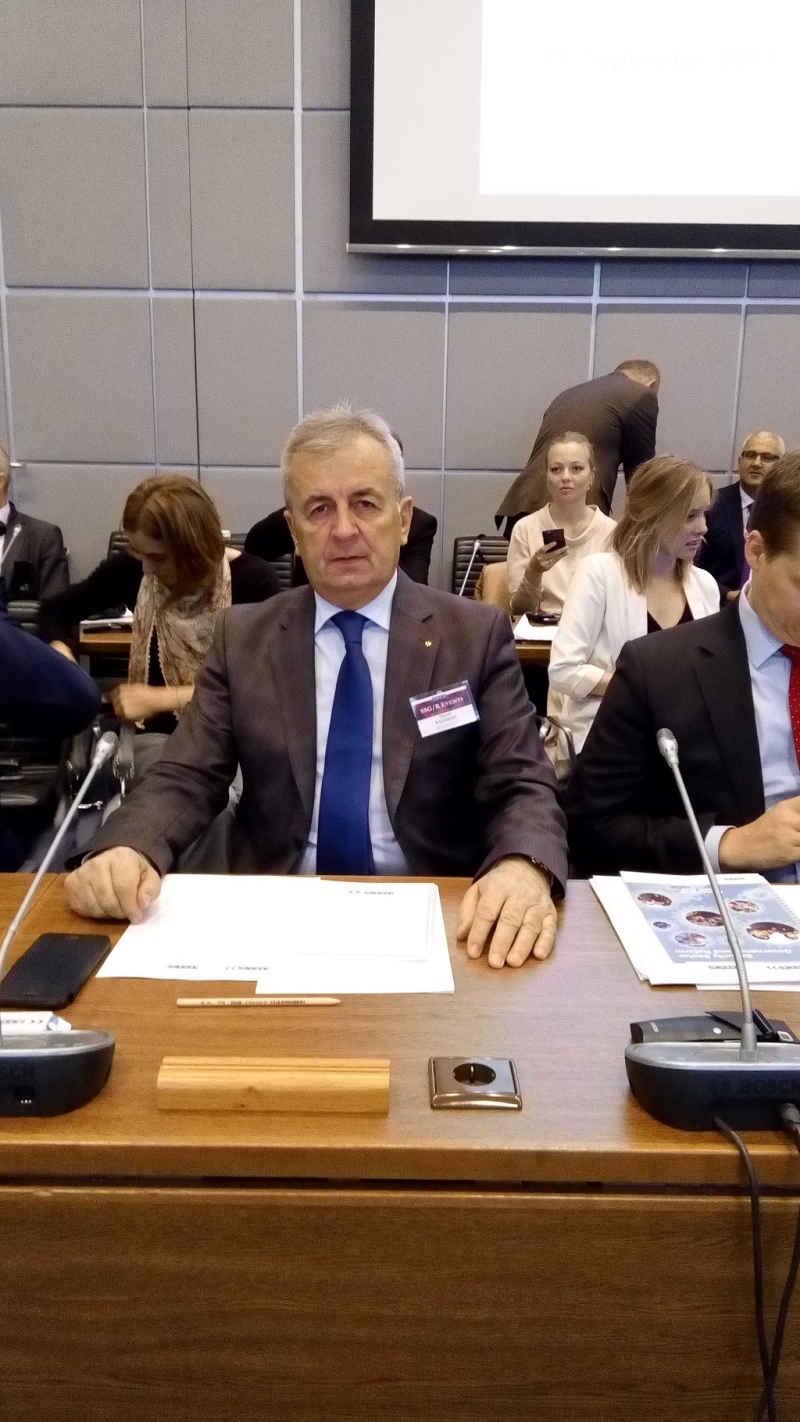At the beginning of the conference, opening remarks were delivered by: Amb. Florian Raunig, Head of the Task Force for the 2017 Austrian OSCE Chairmanship, Amb. Roksanda Ninčić, Permanent Representative of the Republic of Serbia to OSCE and Chair of the OSCE Forum for Security Co-operation, and Amb. Marcel Peško, Director of the OSCE Conflict Prevention Centre.
The first session on the topic: “Strengthening Multilateral Cooperation to Support SSG/R Processes” was moderated by Amb.Thomas Guerber, Director of the Geneva Centre for the Democratic Control of Armed Forces (DCAF), and the participants of the meeting were also addressed by representatives of the institutions dealing with the issues of rule of law and security: Ms Aisser Al-Hafedh, UN representative, Regional Section for Europe, West and Central Asia Division for Operations; Mr Maciej Popowski, Deputy Director-General, Directorate General for Neighbourhood and Enlargement Negotiations, European Commission; and Mr Mr. Thorsten Stodiek, Deputy Head, Strategic Police Matters Unit, OSCE Transnational Threats Department.
It was emphasised on this occasion that multilateral organisations have recognised the need for inclusive and participatory reform processes, which are important for further progress, and a special focus was given to the support provided to SSG/R processes by international actors. During the discussion, high-level representatives from multilateral organisations provided their insights to their respective approaches and discussed similarities and differences, implementation challenges, and opportunities for cooperation.
This was followed by a discussion on the topic: “National Ownership of SSG/R Processes: Strengthening Inclusive and Consultative Processes “, chaired by Mr Ferdinand von Weyhe, Counsellor for Security Sector Reform, Federal Foreign Office of Germany. On this occasion the participants were addressed by: Ms Ainuru Altybaeva, MP, Chairwoman of the Forum of women MPs of the Kyrgyz Parliament; Amb.Pierre von Arx, Head of the OSCE
Programme Office in Bishkek; and Amb. Vuk Žugić, Co-ordinator of the OSCE’s Economic and Environmental Activities.
On the grounds of discussion that followed, the participants of the conference have noted that national ownership is one of the key principles for successful reform processes, and they devoted a special attention to the importance of adopting inclusive and consultative approaches to national ownership of SSG/R
processes, which seeks engagement and cooperation between multiple governmental actors, civil society, academia and the media. In that regard, the participant were able to hear about examples of national ownership of SSG/R processes from different regions in the OSCE area, with the aim of effective exchange of experiences and initiating cooperation in this field.
This was followed by a session dedicated to the topic: “Improving the Governance and Reform of the Security Sector by
including Civil Society”, chaired by Ms. Gudrun Kramer, Director, Austrian Study Centre for Peace and Conflict Resolution (ASPR), when OSCE member states and its executive structures presented their programme and project activities aimed at supporting SSG/R processes. During the session, the participant learned about different approaches to the SSG/R processes, and the following spoke: Ms Ingibjörg Sólrún Gísladóttir, Director of the OSCE Office for Democratic Institutions and Human Rights (ODIHR), Mr Denis Hadžović, Secretary General, Centre for Security Studies (CSS), Ms Sonja Stojanović-Gajić, Director of the Belgrade
Centre for Security Policy (BCSP), and Amb. Andrea Orizio, Head of the OSCE Mission to Serbia.
This session addressed the importance of civil society’s engagement in governance and reform processes to ensure that the security needs, expectations and perceptions of the wider population are well represented. Expert speakers, including representatives from civil society
organizations, discussed how they can contribute to an informed and fact-based discourse on security-related issues, and to enhance the public’s capacity to monitor the performance and conduct of security sector actors. Afterwards, the participants of the conference had the opportunity to learn about examples of security management and reform through the involvement of civil society organisations from different regions from the OSCE member countries.
In the continuation, the session: “The OSCE’s Way ahead in the Field of SSG/R” was focused on the OSCE process towards a more coherent and
coordinated approach to SSG/R and on identifying specific options for the way ahead. This part of the gathering was chaired by Amb. Steffen Kongstad, Permanent Representative, Permanent Delegation of Norway to the
OSCE, and the following were presenters: Amb. Radomír Boháč, Permanent Representative, Permanent Mission of the Slovak Republic to the OSCE and Amb. Marcel Peško, Director of the OSCE Conflict Prevention Centre.
The conference was organised in order to promote a comprehensive and inclusive approach to national security sector reform processes, recognised as leading in conflict prevention, early warning, crisis management and peacebuilding, exchange of experiences among local, national and international actors in this area, as well as to identify possible ways to strengthen the OSCE’s approach to SSG/R.
Through interactive discussion of the participants, the meeting provided a framework to exchange of lessons learned, best practices, and the challenges faced by the participating countries in the security sector reform process and contributed to finding models for enhancing cooperation in this area.
The conference will end today.












